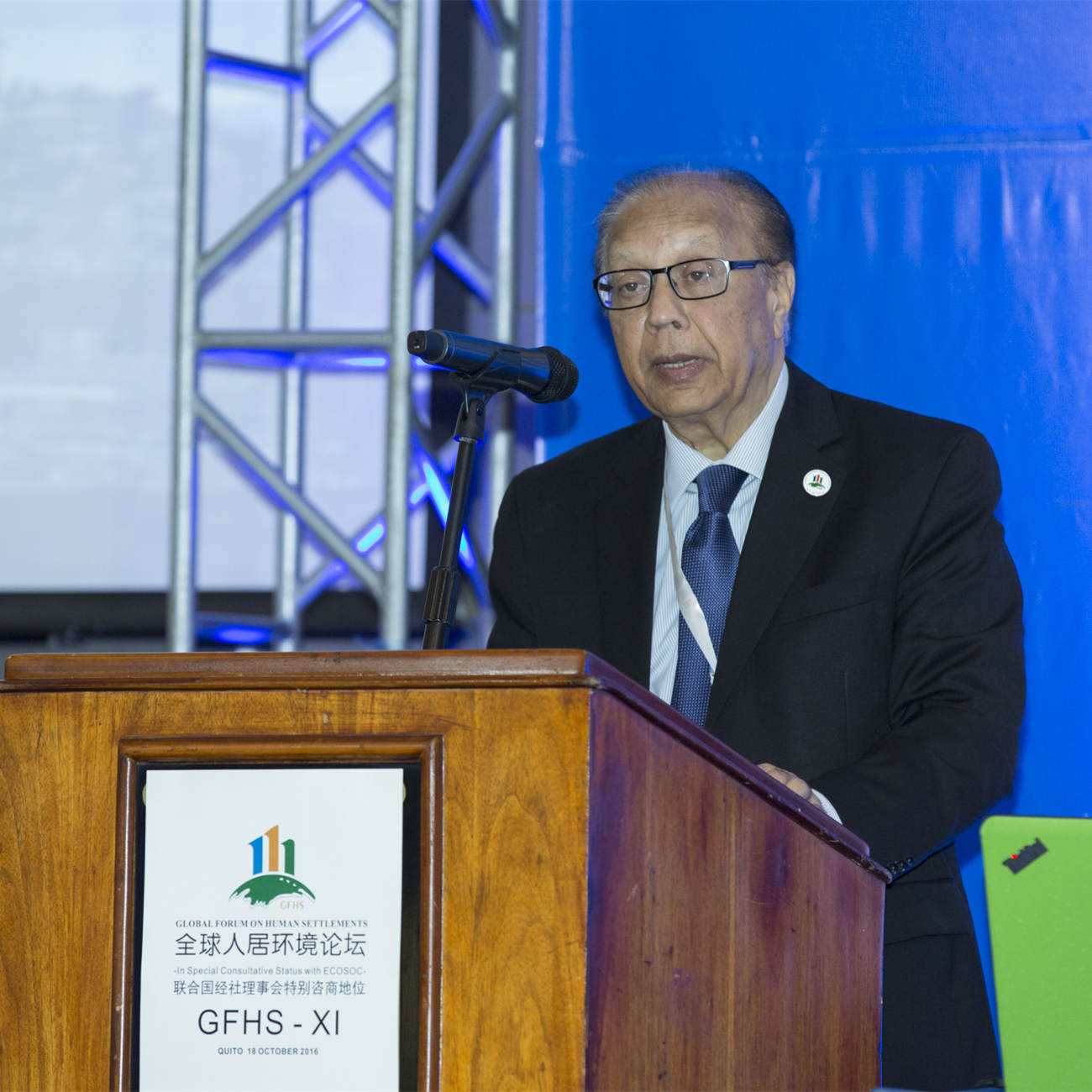


Committed to Sustainable Cities and Human Settlements for All

In Special Consultative Status with ECOSOC
Search
NameDescriptionContent
Home>>Text
Ambassador Anwarul K. Chowdhury: The New Mission of GFHS
Source:
|
Author:gfhsforum
|
Published time: 2017-01-11
|
817 Views
|
Share:

Ambassador Anwarul K. Chowdhury, Chairman of GFHS, Former UN Under-Secretary-General and High Representative
In my capacity as the Chairman of the Global Forum on Human Settlements (GFHS), I extend a very warm welcome to all the participants who have joined us from various part of the globe at the Eleventh Global Forum on Human Settlements (GFHS - XI), taking place on the margins of the bi-decennial United Nations Conference on Housing and Sustainable Urban Development (Habitat III) now being held in Quito, the beautiful capital city of Ecuador.
GFHS - XI is being held under the auspices of the Global Forum on Human Settlements, United Nations Environment Programme, United Nations Human Settlements Programme, and relevant government agencies. The theme of GFHS – XI is “Compact Sustainable City: Towards a Better Life We Need”. I am honored to announce here that bearing in mind the expected outcome of Habitat III on New Urban Agenda, the mission of GFHS has now been tailored as “Committed to Sustainable Cities and Human Settlements for All”.
Our world is going through a very significant turning point in history. Beginning in 2008, for the first time, half of humanity is now living in towns and cities … but this dramatic transition is far from over. We have seen in reality the beginning of a new urban era. It is projected that globally urbanization levels will rise dramatically in the next 35 years to reach 70 percent by 2050. We thus live at a time of unprecedented, rapid, irreversible urbanization. Urban growth is most rapid in the developing world, where cities gain an average of 5 million residents every month. As cities grow in size and population, harmony among the spatial, social and environmental aspects of a city and between their inhabitants becomes of paramount importance.
Urbanization offers unprecedented opportunities for increasing living standards, life expectancy and literacy levels, environmental sustainability and more efficient use of increasingly scarce natural resources. For women, urbanization is associated with greater access to employment opportunities, lower fertility levels and increased independence. Yet urbanization does not necessarily result in a more equitable distribution of wealth and wellbeing. In many low and middle income nations, urban poverty is growing compared to rural poverty.
Extremely poor people living in urban slums are forced, on a daily basis, to significantly compromise their long-term well-being to meet their short-term survival needs. Around a billion people living in the world’s cities today reside in deprived areas with few or no basic amenities. The crisis of poor infrastructure, overcrowding, few resources and poor sanitation facilities is exacerbated further by a high disease and morbidity burden, characterized by high levels of malnutrition among children and the aged and high rate of communicable diseases.
Cities have the potential to shape the future of humankind and to win the battle for sustainable development. Cities are at the forefront of the global battle against climate change. In the last two decades, cities and urban centres have become the dominant habitats for humankind and the engine-rooms of human development as a whole.
While industrialized countries grapple with policies on urbanization and making cities more adaptable, developing countries — which are also experiencing rapid urbanization — face a greater challenge in providing such basics necessities as water and sanitation. A 2015 report from the Save the Children Foundation, “The Urban Disadvantage,” highlighted the large disparities between the rich and the poor in cities in developing countries, especially related to children.
Let me conclude by underscoring that sustainable urban development is one of the most pressing challenges facing the human community in the 21st century. The world’s urban areas are now home to half of the humankind. As more and more people make cities their home, cities will be the arenas in which some of the world’s biggest social, economic, environmental and political challenges will be faced and need to be addressed. It is therefore significant that GFHS has since its establishment been focusing on these challenges at each of its annual conferences. This eleventh in the series with its theme is “Compact Sustainable City: Towards a Better Life We Need”. It is again another timely, relevant and appropriate initiative that is aimed at making the international community alert and proactive.
GFHS - XI is being held under the auspices of the Global Forum on Human Settlements, United Nations Environment Programme, United Nations Human Settlements Programme, and relevant government agencies. The theme of GFHS – XI is “Compact Sustainable City: Towards a Better Life We Need”. I am honored to announce here that bearing in mind the expected outcome of Habitat III on New Urban Agenda, the mission of GFHS has now been tailored as “Committed to Sustainable Cities and Human Settlements for All”.
Our world is going through a very significant turning point in history. Beginning in 2008, for the first time, half of humanity is now living in towns and cities … but this dramatic transition is far from over. We have seen in reality the beginning of a new urban era. It is projected that globally urbanization levels will rise dramatically in the next 35 years to reach 70 percent by 2050. We thus live at a time of unprecedented, rapid, irreversible urbanization. Urban growth is most rapid in the developing world, where cities gain an average of 5 million residents every month. As cities grow in size and population, harmony among the spatial, social and environmental aspects of a city and between their inhabitants becomes of paramount importance.
Urbanization offers unprecedented opportunities for increasing living standards, life expectancy and literacy levels, environmental sustainability and more efficient use of increasingly scarce natural resources. For women, urbanization is associated with greater access to employment opportunities, lower fertility levels and increased independence. Yet urbanization does not necessarily result in a more equitable distribution of wealth and wellbeing. In many low and middle income nations, urban poverty is growing compared to rural poverty.
Extremely poor people living in urban slums are forced, on a daily basis, to significantly compromise their long-term well-being to meet their short-term survival needs. Around a billion people living in the world’s cities today reside in deprived areas with few or no basic amenities. The crisis of poor infrastructure, overcrowding, few resources and poor sanitation facilities is exacerbated further by a high disease and morbidity burden, characterized by high levels of malnutrition among children and the aged and high rate of communicable diseases.
Cities have the potential to shape the future of humankind and to win the battle for sustainable development. Cities are at the forefront of the global battle against climate change. In the last two decades, cities and urban centres have become the dominant habitats for humankind and the engine-rooms of human development as a whole.
While industrialized countries grapple with policies on urbanization and making cities more adaptable, developing countries — which are also experiencing rapid urbanization — face a greater challenge in providing such basics necessities as water and sanitation. A 2015 report from the Save the Children Foundation, “The Urban Disadvantage,” highlighted the large disparities between the rich and the poor in cities in developing countries, especially related to children.
Let me conclude by underscoring that sustainable urban development is one of the most pressing challenges facing the human community in the 21st century. The world’s urban areas are now home to half of the humankind. As more and more people make cities their home, cities will be the arenas in which some of the world’s biggest social, economic, environmental and political challenges will be faced and need to be addressed. It is therefore significant that GFHS has since its establishment been focusing on these challenges at each of its annual conferences. This eleventh in the series with its theme is “Compact Sustainable City: Towards a Better Life We Need”. It is again another timely, relevant and appropriate initiative that is aimed at making the international community alert and proactive.
Copyright © Global Forum on Human Settlements (GFHS)
